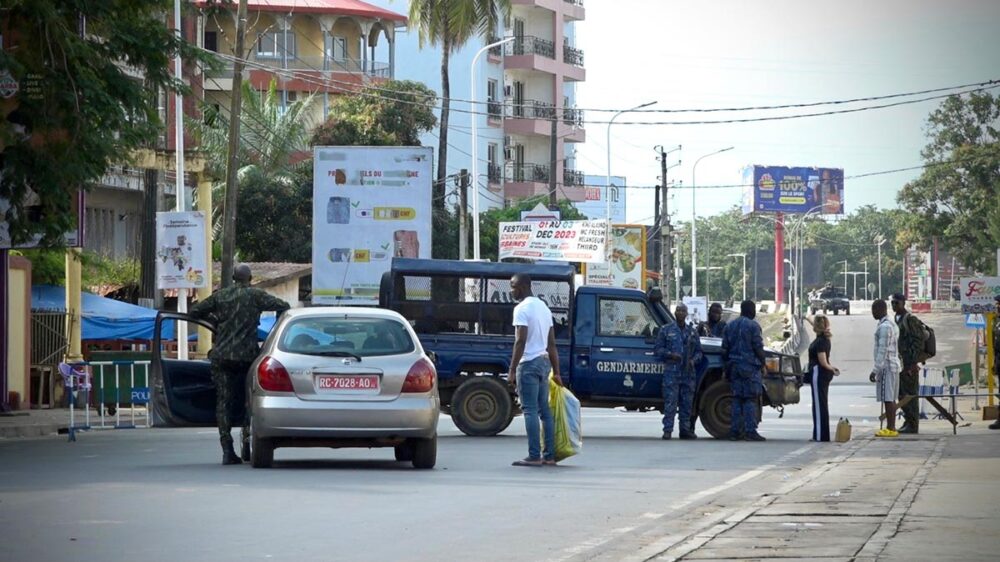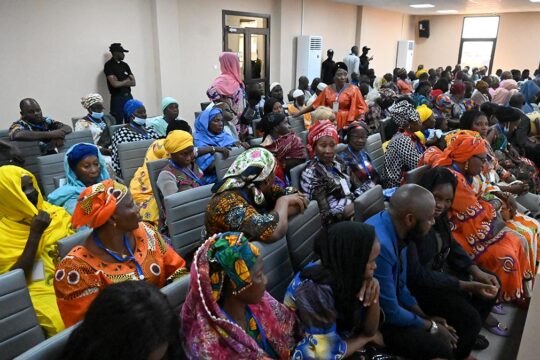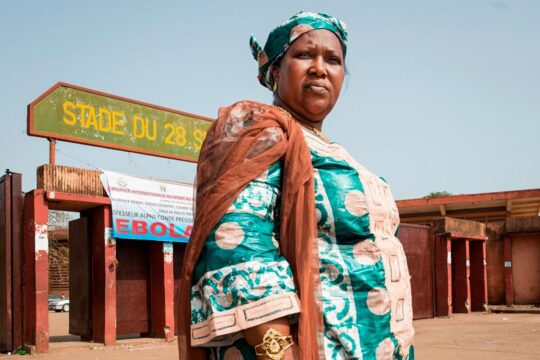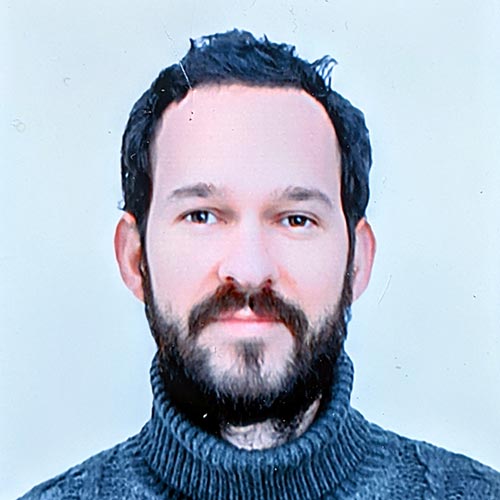It was still dark in the early hours of the morning when two pick-ups -- one with a heavy machine gun -- and a motorbike left Conakry's central prison. The unthinkable had just happened: in Kaloum, the most secure district of the Guinean capital, one of the best-guarded buildings had been attacked by an armed commando and four defendants from the high-profile 28 September 2009 trial had fled. The four are Moussa Dadis Camara, head of state at the time, Moussa Tiegboro Camara, former head of the anti-drug unit, one of his men, gendarme Blaise Goumou, and Claude Pivi, former minister in charge of presidential security. All the escapees are from Forest Guinea, in the southeast of the country.
As they fled, they came under fire several times from security forces: first on the Fidel Castro motorway, near Donka hospital, where according to CCTV footage, the security forces withdrew; and then again on the outskirts of Conakry, where three members of the commando were shot dead. Images of their bodies, covered in cloth, made the rounds on social networks. Their identities have not yet been made public.
The defence and security forces paid a heavy price, with four of their men killed. According to the public prosecutor, a total of nine people were killed on November 4. He also reported the deaths of two civilians, a nurse and a six-year-old girl who were in an ambulance at an army checkpoint. A further six people were injured.
The public prosecutor's office announced that "several wheeled vehicles, weapons of war and grenades were seized". On the day of the escape, three defendants were caught. Tiegboro Camara was the first returned to the central prison. According to his lawyer, he had been abducted and managed to elude his captors. He has filed a complaint against X for "kidnapping, confinement and endangering the lives of others". The same version is given by the lawyer for Dadis Camara, who was re-incarcerated on the afternoon of November 4. In the Guinean media, he stated that "the State has failed in its duty to guarantee the safety of the central prison inmates".
Victims in danger
Pépé Antoine Lamah, Dadis Camara's lawyer, is not the only one to question security related to the 2009 massacre trial. Halimatou Camara, lawyer for the civil parties, says security will have to be "reviewed" and "lessons learned" from what happened. “This escape attempt has generated a certain amount of fear," she notes. “If the prison can be attacked, it's possible that people will be attacked during the hearings. Nothing can be ruled out.”
Pivi on the run poses a serious risk to victims who have testified against him, to the civil parties' lawyers and one of the defendants who challenged him during the trial. On the stand in October 2022, Aboubacar Diakité ("Toumba"), a former aide-de-camp to Dadis Camara, claimed to have seen Pivi in Hamdallaye, a neighbourhood near Conakry Stadium, on the day of the massacre. These statements contradict those of Pivi. He claims to have spent the morning on the outskirts of Conakry, in Manéah, where he was on an operation to arrest soldiers accused of stealing a pickup truck.
A price on Pivi's head
A seasoned soldier, Pivi gained his experience in the 1990s, taking part in peacekeeping operations in Sierra Leone, Liberia and Guinea-Bissau. He is an influential figure in the Guinean army, becoming a key figure towards the end of President Lansana Conté’s rule. After taking power in 2008, Dadis Camara appointed him minister in charge of presidential security. Pivi was accused of playing a leading role in the 28 September 2009 massacre at Conakry stadium, when an opposition rally was violently repressed, killing more than 150 people. He retained senior positions under President Alpha Condé, despite being charged in 2013 in connection with the stadium massacre. Pivi was imprisoned a year ago, a few days before the start of the trial. Today, the whole of Guinea is on his trail: the Justice Minister of is offering nearly €55,000 to anyone who "aids or facilitates the arrest" of Pivi "by giving precise information to the judicial authorities about his exact whereabouts".
Asmaou Diallo, president of the Association of Victims, Relatives and Friends of 28 September 2009 (Avipa), admits that she is "more or less reassured", "given that the government is continuing the search and that there is a price on Pivi's head". “We mustn't let them destroy what we've managed to achieve over the past year with this trial," she says. “In any case, we continue to have confidence in the government.” In a joint statement, Avipa, the International Federation for Human Rights (FIDH) and the Organisation guinéenne de défense des droits de l'homme et du citoyen (OGDH) called on the Guinean authorities to “guarantee the integrity of the ongoing judicial process".
Increased security
Government spokesman Ousmane Gaoual Diallo announced on RFI that the prison had been placed “under a high security regime". The day after the attack, additional staff were mobilised. Several streets around the prison were closed off, including to local residents. Two armoured vehicles were positioned in front of the entrance. In fact, the entire municipality of Kaloum, where the central prison is located, had its security level increased. Roadblocks were set up at key points controlling access to the peninsula, causing major traffic jams at peak times.
An investigation has been opened to shed light on the escape. It is targeting Dadis Camara and his three co-defendants, as well as military personnel and prison officers, for "violation of instructions", "abandonment of post", "manslaughter" and "murder". According to the government spokesman, the commando may have benefited from complicity. Without waiting for the investigations to be completed, around 60 soldiers and prison guards, as well as Pivi, Tiegboro Camara and Blaise Goumou, have been removed from the army. Dadis Camara resigned from the army in 2015.
The security flaws revealed by this attack are gaping. According to the government, Claude Pivi's son Verny Pivi was in charge of the operations. Verny Pivi, a member of the military who was disbarred in 2012 for acts of banditry, had been wanted by the authorities since the beginning of 2023 on military intelligence suspicion that he was planning an attack on the central prison. An operation carried out in the Forest region in January 2023 enabled special forces to capture several members of his group, but Verny managed to escape.
The shadow of the November 4 escape will hang over the stadium massacre trial. It is due to resume on Monday November 13 with the first witness hearings, after another lawyers' strike. The escape will inevitably be raised during the trial, says lawyer Amadou DS Bah, coordinator of the victims' lawyers' collective. "I will bring it up as soon as I have a chance,” he says. For counsel, it is an element "that strengthens the idea that [Dadis Camara] feels guilty, because otherwise he would not have fled". The lawyer thinks the event marks "a turning point". What made this trial exceptional, with most of the senior political and military figures in the dock, has now been damaged, he says.








